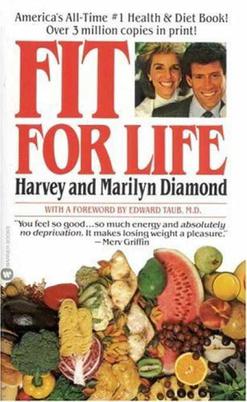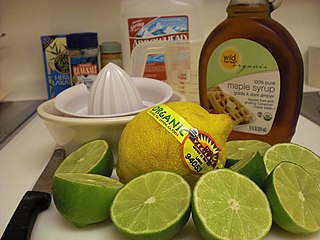Related Research Articles
Dieting is the practice of eating food in a regulated way to decrease, maintain, or increase body weight, or to prevent and treat diseases such as diabetes and obesity. As weight loss depends on calorie intake, different kinds of calorie-reduced diets, such as those emphasising particular macronutrients, have been shown to be no more effective than one another. As weight regain is common, diet success is best predicted by long-term adherence. Regardless, the outcome of a diet can vary widely depending on the individual.

Joel Fuhrman is an American celebrity doctor who advocates a plant-based diet termed the "nutritarian" diet which emphasizes nutrient-dense foods. His practice is based on his nutrition-based approach to obesity and chronic disease, as well as promoting his products and books. He has written books promoting his dietary approaches including the bestsellers Eat to Live, Super Immunity, The Eat to Live Cookbook, The End of Dieting (2016) and The End of Heart Disease (2016). He sells a related line of nutrition-related products.

A fad diet is a diet that is popular, generally only for a short time, similar to fads in fashion, without being a standard scientific dietary recommendation, and often making unreasonable claims for fast weight loss or health improvements; as such is often considered a type of pseudoscientific diet. Fad diets are usually not supported by clinical research and their health recommendations are not peer-reviewed, thus they often make unsubstantiated statements about health and disease.

Raw foodism, also known as rawism or a raw food diet, is the dietary practice of eating only or mostly food that is uncooked and unprocessed. Depending on the philosophy, or type of lifestyle and results desired, raw food diets may include a selection of fruits, vegetables, nuts, seeds, eggs, fish, meat, and dairy products. The diet may also include simply processed foods, such as various types of sprouted seeds, cheese, and fermented foods such as yogurts, kefir, kombucha, or sauerkraut, but generally not foods that have been pasteurized, homogenized, or produced with the use of synthetic pesticides, fertilizers, solvents, and food additives.
Detoxification is a type of alternative-medicine treatment which aims to rid the body of unspecified "toxins" – substances that proponents claim accumulate in the body over time and have undesirable short-term or long-term effects on individual health. Activities commonly associated with detoxification include dieting, fasting, consuming exclusively or avoiding specific foods, colon cleansing, chelation therapy, certain kinds of IV therapy and the removal of dental fillings containing amalgam.
The Cambridge Diet was a very-low-calorie meal replacement fad diet developed in the 1960s. The diet launched with different versions in the US and the UK. The US version filed for bankruptcy and shut down shortly after the deaths of several dieters. The UK diet has also been known as the Cambridge Weight Plan, but is now known as The 1:1 Diet.

The Grapefruit diet is a short-term fad diet that has existed in the United States since at least the 1930s. There are variations on the diet, although it generally consists of eating one grapefruit at each meal, along with meat, eggs, other foods that are rich in fat and protein, and certain vegetables. Sugar, fruits, sweet vegetables, grains and starchy vegetables are to be avoided. The grapefruit diet is thus a low-carbohydrate diet. A typical breakfast menu usually includes bacon and eggs. The diet is based on the claim that grapefruit has a fat-burning enzyme or similar property. The grapefruit diet does not require exercise. The grapefruit diet lasts for 10 to 12 days followed by 2 days off.

Juice fasting, also known as juice cleansing, is a fad diet in which a person consumes only fruit and vegetable juices while abstaining from solid food consumption. It is used for detoxification, an alternative medicine treatment, and is often part of detox diets. The diet can typically last from one to seven days and involve a number of fruits and vegetables and even spices that are not among the juices typically sold or consumed in the average Western diet. The diet is sometimes promoted with implausible and unsubstantiated claims about its health benefits.
The Beverly Hills Diet is a fad diet developed by author Judy Mazel (1943–2007) in her 1981 bestseller, The Beverly Hills Diet.

Sensa is an American brand of diet aid created by Alan Hirsch, an American neurologist and psychiatrist. The product lacks scientific evidence of effect and has been the subject of controversy and lawsuits. Following a $26 million fine by the U.S. Federal Trade Commission in 2014, the company ceased operations.

Fit for Life is a diet and lifestyle book series stemming from the principles of orthopathy. It is promoted mainly by the American writers Harvey and Marilyn Diamond. The Fit for Life book series describes a fad diet which specifies eating only fruit in the morning, eating predominantly "live" and "high-water-content" food, and, if animal protein is eaten, avoiding combining it with complex carbohydrates.

Master Cleanse is a modified juice fast that permits no food, substituting tea and lemonade made with maple syrup and cayenne pepper. The diet was developed by Stanley Burroughs, who initially marketed it in the 1940s, and revived it in his 1976 book The Master Cleanser. Proponents claim that the diet tones, reduces and cleanses the body, allowing the body to heal itself. There is no evidence that the diet removes any toxins or that it achieves anything beyond temporary weight loss, followed by rapidly regaining the lost weight.
William R. Davis is a Milwaukee-based American cardiologist, low-carbohydrate diet advocate and author of health books known for his stance against "modern wheat", which he labels a "perfect, chronic poison."

Mark Adam Hyman is an American physician and author. He is the founder and medical director of The UltraWellness Center and was a columnist for The Huffington Post. Hyman was a regular contributor to the Katie Couric Show until the show's cancellation in 2013. He writes a blog called The Doctor’s Farmacy, which examines many topics related to human health and welfare. He is the author of several books on nutrition and longevity, including Food Fix, Eat Fat, Get Thin, and Young Forever.
Fred Pescatore is a Manhattan-based author and internist who specializes in nutrition. He is best known as the author of the bestselling children's health book Feed Your Kids Well (1998) and The Hamptons Diet (2004).

Joe Cross is an Australian entrepreneur, author, filmmaker, and plant-based diet advocate who promotes juicing. He is most known for his documentary Fat, Sick & Nearly Dead in which he tells the story of his 60-day juice fast. He is the founder and CEO of Reboot with Joe, a health and lifestyle brand.
KE diet, also known as feeding tube diet, is a fad diet in which an individual is fed a proprietary mixture through a feeding tube for a specific number of days. The dieter does not eat anything while on the diet. It has also been called the "Feeding Tube" diet in the United States.

Dave Asprey is an American entrepreneur, author and advocate of a low-carbohydrate high-fat diet known as the Bulletproof diet which has been criticized by dietitians for making pseudoscientific claims. He founded Bulletproof 360, Inc. in 2013, and in 2017, founded Bulletproof Nutrition Inc. Men's Health described Asprey as a "lifestyle guru".
Anthony William Coviello, known professionally as Anthony William or the Medical Medium, is a self-proclaimed medium who offers health advice based on alleged communication with a spirit. He authors books and offers advice online on forums such as Gwyneth Paltrow's Goop column and his own website. William believes that the Epstein-Barr virus is responsible for multiple ailments, including cancer. He claims to be the originator of the lemon juice in water morning detox as well as celery juicing, which he claims can offer many health benefits. Critics allege that he is practicing medicine without a license and that he has, at times, improperly solicited positive Amazon reviews for his books.
References
- ↑ Burkart, Gregory. "The Latest Celebrity Health Fad: The Werewolf Diet". Fearnet. Retrieved 10 February 2014.
- ↑ "Werewolf Diet: Will juice cleanses during full moons help you lose weight?". NYDN. Retrieved 10 February 2014.
- ↑ Gans, Keri. "Forget Cavemen, Now Everyone's Eating Like a Werewolf". Shape. Retrieved 10 February 2014.
- 1 2 3 "Should You Try the Werewolf Diet?". US News. Retrieved 10 February 2014.
- 1 2 3 Sifferlin, Alexandra. "Promising the Moon: The Truth Behind the Werewolf Diet". TIME. Archived from the original on January 30, 2014. Retrieved 10 February 2014.
- ↑ "Madonna and Demi's "Werewolf" Diet". Woman's Day (MSN). Retrieved 10 February 2014.
- ↑ Melone, Linda (30 January 2014). "The Latest Diet Fad That Involves...Werewolves? Oh, And Moons". Prevention. Retrieved 10 February 2014.
- ↑ Borreli, Lizette (27 January 2014). "The Werewolf Diet: Eating To Lunar Calendar Helps You Lose 6 Pounds In 24 Hours, Claims Say". Medical Daily. Retrieved 10 February 2014.
- 1 2 Lindenmuth, Katy (30 January 2014). "Should You Try the Werewolf Diet?". Women's Health Magazine. Retrieved 10 February 2014.